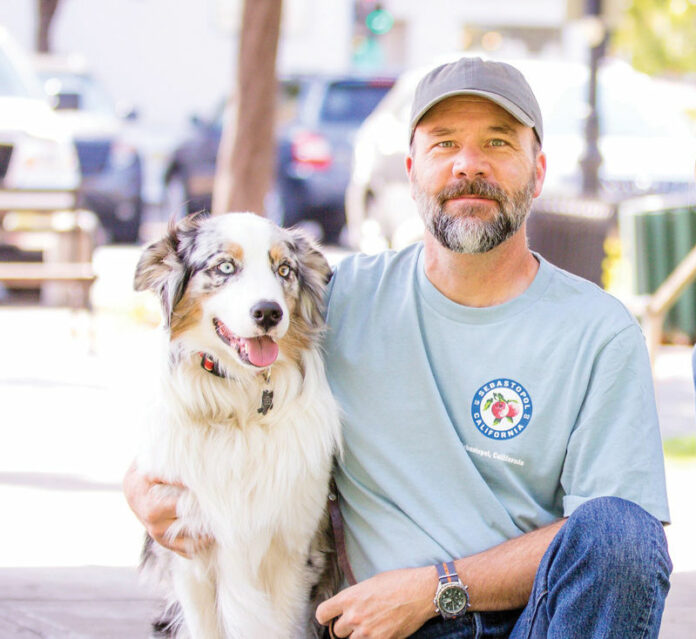The Sebastopol City Council chose Councilmember Patrick Slayter as the town’s mayor for 2020 at the city council meeting on Dec. 3.
Unlike most larger cities, where the mayor is elected by the citizenry, the mayor for Sebastopol is elected by the city council, which every December appoints one of its members as mayor for the upcoming year.
Slayter was voted in by four out of the five councilmembers, including Una Glass, Sarah Glade Gurney, outgoing Mayor Neysa Hinton and himself. Councilmember Una Glass was chosen to be vice mayor.
Councilmember Michael Carnacchi, who last year expected to be elected mayor by his fellow councilmembers but was passed over, was absent from the meeting.
This is Slayter’s third go-round as mayor since he was first elected to the council in 2010.
How does Slayter see the mayor’s role?
“In Sebastopol, the mayor runs the meetings and signs the letters and gets to do fun things like say hello to the community at the events like last night’s tree lighting,” Slayter said. “Also you’re kind of a first point of contact for a lot of residents. Your name is listed first on the city council webpage so you’re the person that may get more emails.”
He said running a council meeting is a bit of a balancing act.
“There are two things going on simultaneously,” he said. “The first is the nuts and bolts of running the meeting: making sure that everybody has the opportunity to say what they want to say, including council members, as well as the public and staff. And then, it is also a matter of being one of those voices.”
One of the things Slayter likes best about his position on the council is that he is continually learning. When he first got into politics, a long-time politician explained the job of local government to him this way:
“If you’re not an attorney, you will learn about the law; if you’re not an architect or developer, you will learn about land use; if you are not an engineer, you’ll learn about sewer and water systems. And finance, the same thing.”
“So there’s all these different things that are all connected in some way, but there’s also a lot of disparate ideas and deals that you need to pull together and things to learn about,” he said.
Helping citizens learn about local government
Slayter has several things he’d like to see happen in the coming year. The first is to help people in Sebastopol learn more about how their local government works.
“One of the goals that I would like to work on this year would be to establish a citizens academy, where residents can learn about the inner workings of local government,” he said.
Slayter got the idea from the Sebastopol Citizens Police Academy that the Sebastopol Police Department ran for several years.
“It was a multi-part, multi-week primer on the police department that was really well attended and well received,” he said. “So I thought it might be nice to expand it city wide, just to be able to let people see behind the curtain and learn about the way that our government, which we all share, operates.
“I found over my tenure on the council that just a modicum of explaining the process and helping people understand what that process is and why we’re taking the steps we’re taking is incredibly useful,” he said.
“Once people understand the way that the process works then I think it’s a whole lot easier to have people then talk about the things that are important to them in ways that are helpful rather than just inflammatory.”
He understands that government can be a contentious process and likens it to his experience in architecture school, where every few weeks he had to submit a carefully constructed project only to have a review team of three professors “tear it to shreds.” The point of the process was to incorporate their concerns and produce a better iteration the next time around.
He said that government works in a similar fashion — it’s an ongoing cycle of presentation, criticism, revision and, hopefully, improvement.
“Regardless of whether it’s a climate emergency resolution, a design review project, the budget or talking about a new city position, having people explain what they’re thinking and their reasons and allowing that open dialogue is a real winner,” he said. “It’s the way that democracy is supposed to work.”
Learning how to effectively be a part of that process is what the Sebastopol Citizens Academy would be all about, he said.
In addition, Slayter said he would like to have some smaller, more casual, drop-in get-togethers where citizens could learn what was happening in the city.
“A smaller version of this would be monthly co-hosted coffee-klatch-type meetings with me, a rotating group of department heads and one other council member,” he said.
Looking for progress on two long-term projects
Slayter also said he’d like to find a way to streamline the city’s “goals and priorities process,” which for as long as he can remember has been a bureaucratic bugaboo that consumes hours, and often days, of the council’s time without producing anything very useful.
He’d also like to see some progress in the hiring of a “community vitality” coordinator, which would be a cross between an economic development coordinator and a more general community booster.
“Rather than an economic vitality person or economic development director or whatever, I like the term ‘community vitality’ because so much of what we think of as a community’s vitality comes from its residents in close concert with its business community,” he said. “We’re all in this together, right? To not look at them as a partnership, I think is a little short sighted.”
Thinking globally and locally
Slayter is clearly a process wonk, but he has his eyes set on both global and local issues as well.
In the short speech he gave after being elected mayor by the council, he said, “Let’s take a stand when needed about bigger things like civil rights, student safety, transparent and honest government, working for the people and not self interest, and also — the elephant in the room — climate change.”
He continued, “Let’s work together on local issues like traffic, maintaining our streets, providing supportive services to the sheltered and the shelterless, remembering that discussion before decision is an important concept.”
Party animal
Finally, Slayter said he wanted to help Sebastopol have a bit more fun.
“I think that communities need to consider ways to have fun,” he said, mentioning how popular the Peacetown Concerts in Ives Park have been, as well as events like The Barlow’s Third Thursdays. “Gatherings like this help us be a little bit more connected.”
He feels we need more community events like the Apple Blossom Parade and the Gravenstein Apple Fair. He spoke, rather longingly, about all the quirky little festivals that other nearby towns have, like the Fools Parade in Occidental; the Howl-o-ween Pet Parade in Healdsburg, and even the early morning St. Patrick’s Day parade and pub crawl in Healdsburg.
“We’ve got plenty of serious to tide us over,” he said, but suggested that there was room “to lighten it up a little bit and have more fun.”









